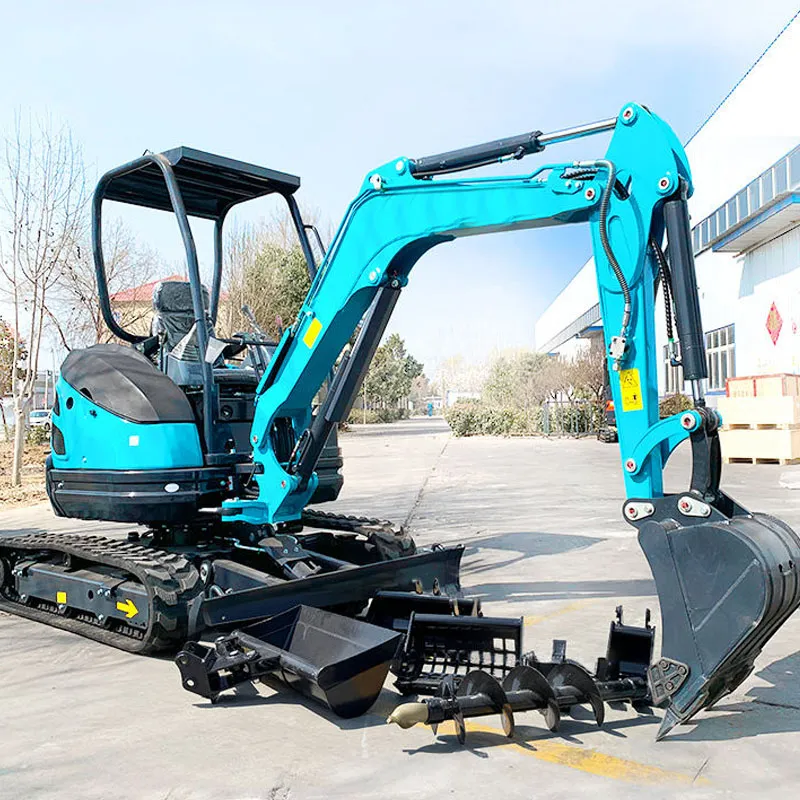
In agriculture, especially on farms, the choice of equipment directly impacts production efficiency and operational results. As small and flexible machinery, mini excavators, with their unique advantages, have become essential tools for many farm operations. The following details the applications and advantages of mini excavators in farming.
Due to their compact design, mini excavators generally feature a narrow body less than 1.5 meters, allowing them to navigate orchards with a 2-meter row spacing. Their tailless slewing technology (tail slewing radius ≤ track width) makes them particularly suitable for working in confined spaces such as greenhouses.
The mini excavator's widened tracks effectively prevent sinking, a common problem in paddy fields in Southeast Asia. The four-wheel drive crawler design allows for stable operation on slopes of up to 15 degrees.
With its quick-change attachments, a single mini excavator can perform tasks such as deep tillage (turning the soil layer 20-30 cm), precise trenching (with a trench shaping error of less than 5 cm), and orchard root pruning (with specialized tools that achieve 20 times the efficiency of manual labor).
One of the greatest advantages of mini excavators is their high maneuverability. Compared to traditional large excavators, mini excavators are smaller and can maneuver freely in narrow and complex farmland environments. This allows them to easily access areas that larger machines cannot reach, such as around trees, for irrigation system maintenance, and for various excavation and reclamation operations within limited land space. Their flexible maneuverability, especially around turns and slopes, improves work efficiency.
Mini excavators are particularly suitable for farm infrastructure construction, such as soil improvement, tunnel excavation, and underground pipeline laying. Micro excavators can precisely control the digging depth and angle, resulting in more uniform soil loosening and promoting the growth of crop roots. In applications requiring precise work, such as tree and vegetable planting, the efficient operation of a mini excavator can help farmers improve soil structure and promote healthy crop growth.
Farms require frequent land leveling and tillage, especially before the plowing season. Equipped with various attachments (such as buckets, coulters, and rotary tillers), mini excavators can quickly complete large-scale land leveling tasks, reducing manual labor. Their powerful digging capacity and adaptability to both soft and hard soils enable efficient operation in a variety of terrains, significantly improving farm management and productivity.
In farm settings, mini excavators are widely used for the installation and maintenance of irrigation systems. They precisely dig trenches for laying pipes and cables, ensuring quality and progress. Due to their compact size, mini excavators can perform efficient work without disrupting existing farmland structures, avoiding extensive land disturbance.
Mini excavators have a significantly lower investment cost than large excavators, yet they can perform most farm tasks, offering farmers exceptional cost-effectiveness. For smaller farms, using a mini excavator can significantly reduce equipment purchase and maintenance costs, while also effectively improving productivity and reducing reliance on labor. Fuel-powered models consume 30% less fuel per acre than traditional agricultural machinery, and their average daily workload is equivalent to that of 10 workers. Their payback period is generally less than eight months. The mini excavator's low fuel consumption and extended operating time further enhance its economical efficiency.
Mini excavators not only perform basic excavation tasks but also allow for quick interchange of various attachments, such as tillers, soil looseners, and drills, to meet diverse farm operational needs. This high adaptability allows mini excavators to be used for a wide range of farm tasks, such as drilling, tree planting, and ditch clearing, greatly enhancing their operational versatility and flexibility.
Mini excavators can replace many traditional manual labor tasks, especially in high-intensity or high-risk environments, effectively reducing labor intensity and improving safety. Common farm tasks like digging and trenching, if performed entirely manually, are not only inefficient but also pose a risk of injury. Using a mini excavator can significantly reduce these risks and ensure smooth operation.
Farm terrain varies, including muddy fields, slippery grass, soft sand, and hard rock. Mini excavators, with their lightweight design and strong adaptability, can adapt to various operating environments. They can operate efficiently on flat ground while also operating stably in more complex terrain, greatly enhancing their applicability.
|
Scenario Type |
Technical indicators |
Improved efficiency |
|
Vegetable greenhouse |
Working height≤1.8m |
Land utilization rate +25% |
|
Terrace transformation |
Side slope stability angle≥25° |
Construction cost -40% |
|
Aquaculture |
Silt cleaning efficiency 3 mu/hour |
Yield per mu +30% |
As a highly effective tool in modern farm management, mini excavators have gradually become an essential component of farm equipment due to their flexibility, affordability, and versatility. Whether leveling land, improving soil, laying pipelines, or digging ditches, mini excavators provide professional and efficient support, particularly for family farms and specialty planting scenarios. With the continuous development of agricultural mechanization, mini excavators will play a vital role in more farm operations. In the future, the widespread adoption of autonomous driving technology will further increase the rate of agricultural mechanization, bringing farmers higher productivity and lower operating costs.
If you'd like to customize your ideal mini excavator, please contact us. We can provide custom designs.